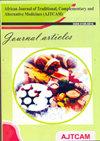Potential antifungal activity of different honey brands from Pakistan: a quest for natural remedy
African Journal of Traditional, Complementary and Alternative Medicines
Pub Date : 2017-10-01
DOI:10.21010/AJTCAM.V14I5.3
引用次数: 8
Abstract
Background: Besides a wholesome food, honey is known for its therapeutic implications. We investigated the antifungal activity of five honeys of different types from Pakistan against various pathogenic fungal strains. Antifungal properties of processed and non-processed honey were determined. Materials and Methods: The antifungal assay of honey was carried out against Aspergillus niger, Aspergillus flavus, Aspergillus fumigates, Alterneria alternata, Fusarium solanai, Microsporum canis, Penicillium funiculosium and Rhizopus solanai. Different dilutions of honey samples were used (20%, 50%, 70%, 90% and 100% w/v so as to find out the minimum effective concentration of each honey type. Results: It was observed that all of the honey samples were highly active, with percent inhibition range of (3-81%) for Aspergillus niger, (2-82%) for Aspergillus flavus, (1-76%) for Aspergillus fumigates, (1-84%) for Alterneria alternata, (2- 67%) for Fusarium solanai, (1-87%) Microsporum canis, (2-78%) Penicillium funiculosium and (1-86%) for Rhizopus solanai. Conclusion: The study of Pakistani honey brands reveals that they possess a substantial antifungal nature. Therefore, they may be used in curing fungal infections along with antifungal drugs as a cheaper alternative natural remedy with no side effects.来自巴基斯坦的不同蜂蜜品牌的潜在抗真菌活性:寻求自然疗法
背景:除了一种有益健康的食物外,蜂蜜还以其治疗作用而闻名。研究了巴基斯坦5种不同类型蜂蜜对不同病原菌的抑菌活性。测定了加工蜂蜜和未加工蜂蜜的抗真菌性能。材料与方法:对蜂蜜进行黑曲霉、黄曲霉、烟熏曲霉、互交霉、茄枯菌、犬小孢子菌、真菌青霉和茄根霉的抑菌试验。采用不同稀释度的蜂蜜样品(20%、50%、70%、90%和100% w/v),找出每种蜂蜜的最小有效浓度。结果:蜂蜜对黑曲霉(3 ~ 81%)、黄曲霉(2 ~ 82%)、烟熏曲霉(1 ~ 76%)、互花霉(1 ~ 84%)、茄枯萎菌(2 ~ 67%)、犬小孢子菌(1 ~ 87%)、真菌青霉(2 ~ 78%)、茄根霉(1 ~ 86%)的抑制范围均为高活性。结论:对巴基斯坦蜂蜜品牌的研究表明,它们具有实质性的抗真菌性质。因此,它们可以与抗真菌药物一起用于治疗真菌感染,作为一种更便宜的无副作用的替代天然疗法。
本文章由计算机程序翻译,如有差异,请以英文原文为准。
求助全文
约1分钟内获得全文
求助全文
来源期刊
自引率
0.00%
发文量
0
审稿时长
6-12 weeks
期刊介绍:
The “African Journal of Traditional, Complementary and Alternative Medicines (AJTCAM)” is a peer-reviewed, multidisciplinary, international, scientific Open Access Journal that provides publication of articles on phytomedicines, ethnomedicines and veterinary ethnomedicines. The journal is published by a Non-Governmental Organization (NGO) known as “African Traditional Herbal Medicine Supporters Initiative (ATHMSI)”. The Journal welcomes submission of manuscripts that meet the general criteria of significance and scientific excellence. Papers will be published approximately two-to-three months after acceptance

 求助内容:
求助内容: 应助结果提醒方式:
应助结果提醒方式:


